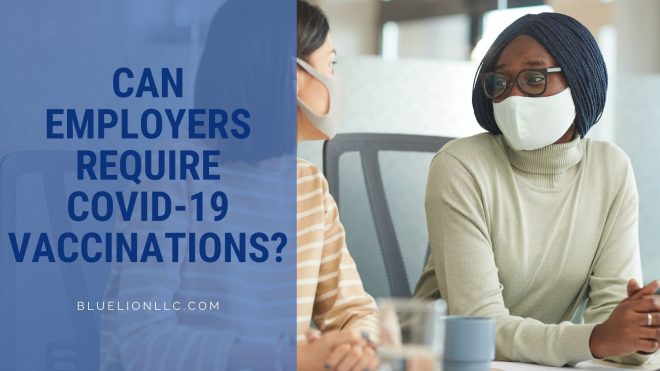
As coronavirus vaccinations continue to roll out and companies plan to return to “normal” business operations, a new complicated question comes to the forefront: Can employers require COVID-19 vaccinations prior to employees returning to the workplace?
The short answer is yes. The long answer comes with a few other key questions as you decide whether or not to establish a mandatory vaccination policy, including:
- Are there exceptions?
- Should employers require COVID-19 vaccination?
- Can employers ask or require employees to show proof of vaccination?
Both the Centers for Disease Control (CDC) and Equal Employment Opportunity Commission (EEOC) has released guidance for employers about mandating vaccination, which we’ve summarized below.
Can employers require COVID-19 vaccination?
The EEOC determined that COVID-19 meets the “direct threat” definition and issued guidance clarifying that employers are legally permitted to require employees to be vaccinated before returning to work.
The EEOC defines a direct threat as one that poses a significant risk of substantial harm to the health or safety of the individual or others that cannot be eliminated or reduced by reasonable accommodation.
Are there exceptions?
Yes, medical and religious exemptions can be made.
Medical Accommodations
Under the Americans with Disabilities Act (ADA), employers must accommodate employees with medical conditions or disabilities that prevent them from receiving the COVID-19 vaccine (e.g., a history of allergic reaction to vaccine ingredients, or an employee who is pregnant or nursing and has been advised against vaccination by a doctor).
You may deny a disability-related accommodation if there is no other way to reduce the “direct threat” posed by an unvaccinated employee. Keep in mind, however, that you’ll need to conduct an individualized assessment to determine whether a direct threat exists. While you may be able to exclude an employee from the workplace, you may need to provide alternative accommodation, like remote work.
Companies may be able to accommodate unvaccinated employees within the workplace because the CDC still recommends the continued use of personal protective equipment, health checks, masks, and social distancing.
Religious Accommodations
Employees can decline vaccination due to religious beliefs under Title VII of the Civil Rights Act of 1964. Employers must reasonably accommodate these individuals and should generally assume requests for religious accommodations are based on sincerely held beliefs.
Secular or medical beliefs (i.e., having anti-vaccination views) are not sufficient. The beliefs must be based on religion to qualify for accommodations.
An employer can decline accommodation if it would create an “undue hardship” (i.e., having more than a de minimus cost or burden). You should only question an employee’s religious accommodation request if you have an objective basis for doing so, at which point you can request additional information.
Should employers require COVID-19 vaccination?
Just because you can mandate vaccination does not necessarily mean you should. Evaluate your industry and the nature of your company’s work: Are your employees at risk? Do they put others at risk (e.g., health care, travel, retail)? Certain employees may choose to leave a company based on whether or not they establish a vaccination policy. This can lead to reduced productivity and negative publicity.
Consider encouraging rather than requiring vaccinations (especially in areas where the vaccine is not available to everyone yet). This relieves you of the obligation to conduct disability- and religious-related accommodation analyses.
You could even offer incentives to get vaccinated like extra PTO and gift cards. Just beware that if you do this, you may need to make accommodations for those employees who aren’t eligible for the incentive due to medical conditions or religious beliefs that prevent them from receiving the vaccine.
Can employers ask or require employees to show proof of vaccination?
Yes, the EEOC has clearly stated this request is not a disability-related inquiry subject to ADA restrictions. You might make this request as you plan to return to regular business practices, like in-person meetings and travel requirements.
Collecting vaccination information will also help your business handle quarantine requirements if there is a workplace exposure. The CDC has stated that vaccinated, asymptomatic individuals do not have to quarantine or test after a known exposure.
As you plan for a return to the physical workplace, communicate openly with your team regarding their comfort levels and vaccinations. You may start with a non-mandatory policy and switch to a mandatory one in the future if it makes sense for the health and safety of your employees and customers.
If you have questions or need customized guidance on creating a COVID-19 vaccination policy, contact BlueLion today at 603-818-4131 or info@bluelionllc.com. Our HR professionals will be happy to help your company navigate this ever-changing situation.
The information on this website, including its newsletters, is not, nor is it intended to be legal advice. You should contact an attorney or HR specialist for advice on your individual situation.



